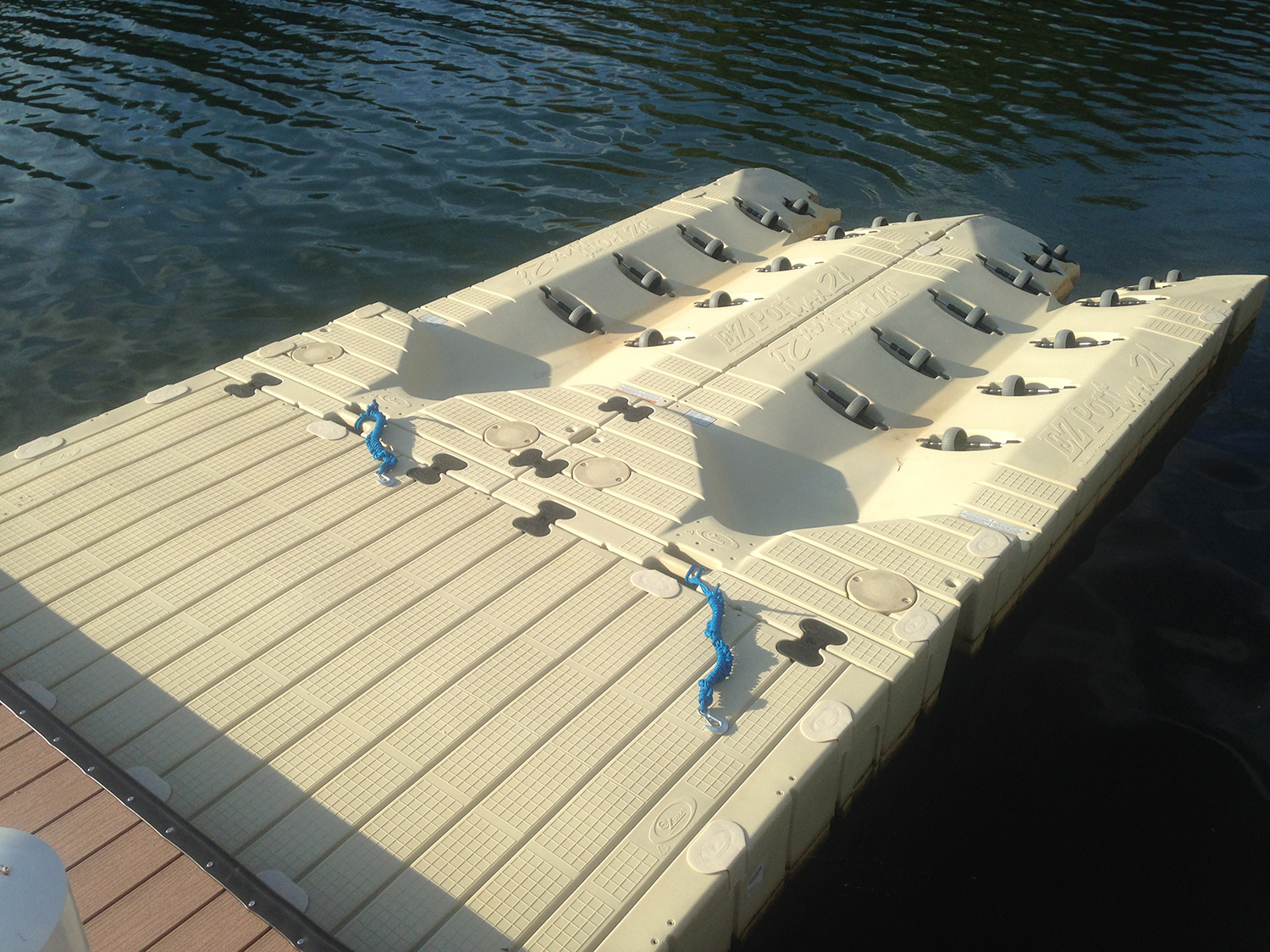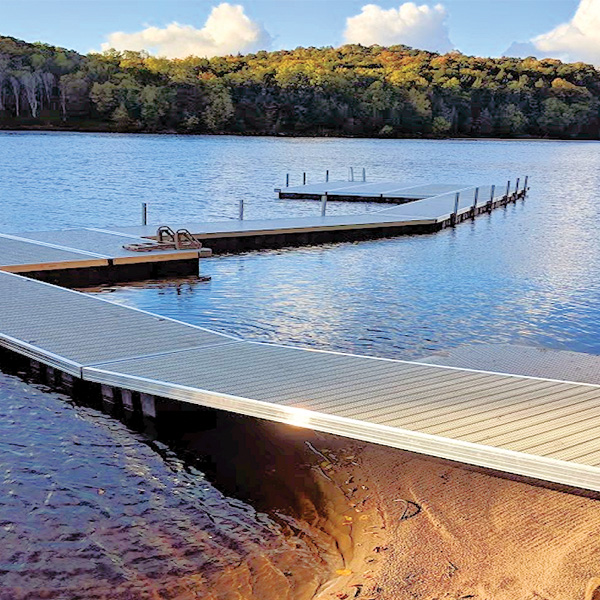Floating Docks: The Perfect Option for Versatile Water Access
Floating docks existing an engaging option for a variety of water access requires, supplying adaptability that transcends traditional mooring alternatives. The modular nature of floating docks promotes personalization, providing to certain requirements.
Advantages of Floating Docks
Floating docks offer countless advantages that enhance water accessibility for different applications. Their ability to drop and increase with changing water degrees makes them particularly useful in environments with fluctuating trends or seasonal variations. This flexibility guarantees that vessels can conveniently anchor without problem for the water's deepness, providing a trusted platform for entertainment, industrial, and commercial usages.
In addition, floating docks are typically constructed from resilient materials that withstand deterioration, making them ideal for lasting usage in marine settings. Their setup is commonly much less invasive than typical set docks, decreasing the environmental influence and promoting quicker implementation (floating dock company). This versatility enables less complicated relocation or reconfiguration according to user demands or ecological changes
Safety and security is an additional crucial advantage; floating docks can offer secure access for people disembarking or boarding from boats and decrease the risk of accidents connected with unsteady surface areas. They can be created to accommodate a range of accessories, such as cleats and fenders, improving functionality. In general, floating docks represent an effective service for enhancing water access across varied markets while advertising safety and security and ecological sustainability.

Kinds Of Floating Docks
Numerous sorts of floating docks satisfy different requirements and settings, each made with details features to optimize functionality. The most usual types include modular docks, which contain interlacing sections that enable easy personalization and growth. These docks are perfect for entertainment usage, as they can be tailored to fit various watercraft sizes and water problems.
One more popular option is the fixed floating dock, which stays secured in location but drifts with transforming water levels. dock company. This type is particularly matched for locations with minimal tidal changes, giving steady access for angling or swimming. Furthermore, there are drive-on docks, which include a sloped style that permits boats to quickly drive on and off, making them ideal for personal watercraft and smaller sized vessels
For business applications, heavy-duty floating docks are available, created from strengthened materials to hold up against significant lots and extreme marine atmospheres. Environment-friendly floating docks use sustainable materials and styles to decrease environmental effect, often incorporating attributes like vegetation to support local wild animals. Comprehending the different types of floating docks guarantees that customers can choose one of the most appropriate solution for their details needs.
Installation Process Overview
A successful installation of floating docks needs careful preparation and focus to information to make sure optimal performance and security. The first action entails assessing the site conditions, including water depth, current, and potential obstacles. This analysis informs the choice of the proper dock products and style tailored to the certain environment.
Next, acquiring essential licenses is essential, as numerous territories have laws pertaining to construction on water bodies. Once consents are protected, the setup can proceed. Begin by preparing the structure, which may entail anchoring systems or pilings customized to the dock kind and neighborhood problems.
Following the foundation arrangement, set up the dock sections according to manufacturer specifications. Guarantee that all components are safely attached and straightened to stand up to environmental stresses. Placement the dock in the marked location, ensuring it is level and steady.

Maintenance Tips and Ideal Practices
After the installment procedure is complete, ongoing upkeep plays an essential function in ensuring the longevity and capability of floating docks. Regular evaluations should be carried out to identify any indications of degeneration, damage, or wear - floating dock builder. Look for any loosened fittings, splits, or splitting up in the dock sections, as these can endanger architectural honesty
Cleaning the dock is important to eliminate debris, algae, and various other build-up that can affect its look and safety. Make use of a mild pressure clean periodically to maintain cleanliness without triggering damages to the surface. Additionally, applying a safety sealer every couple of years can aid boost long life and withstand ecological wear.
Take note of the mooring lines and supports, ensuring they are safe and secure and totally free from corrosion. Replace any kind of degraded components immediately to stay clear of threats. Seasonal modifications might likewise be needed; throughout extreme weather condition problems, reinforcing the dock or rearranging can prevent damage.
Applications for Floating Docks
Floating docks serve a wide range of applications, accommodating both industrial and leisure demands. In entertainment setups, they supply seamless access to rivers for activities such as boating, fishing, and swimming. Their adjustable nature permits for setup in differing water levels, guaranteeing steady and secure access no matter tidal fluctuations.
Readily, floating docks are crucial for marinas and waterside businesses. They facilitate the docking of vessels, making it possible for effective dumping and filling of goods. Their modular design enables simple growth or reconfiguration to suit altering business demands, making them ideal for boat services, excursion procedures, or fishing charters.
Additionally, floating docks are utilized in ecological applications such as marine research and habitat restoration. They can work as platforms for clinical studies, checking water quality, or performing wildlife surveys without troubling sensitive ecological communities.
In commercial contexts, floating docks are used in construction tasks, giving accessibility to hard-to-reach locations for tools and employees. Their convenience, durability, and very little influence on the setting make them an optimal their explanation selection for a large range of applications, improving both performance and access in various water-based environments.
Verdict
Finally, floating docks stand for an optimal remedy for varied water access needs, owing to their flexibility, longevity, and modular design. These structures facilitate safe mooring for different applications while minimizing ecological effect during installment. The reduced maintenance demands better read more enhance their practicality. Floating docks serve as a valuable asset for recreational, business, and ecological jobs, making sure dependable accessibility to waterways and advertising sustainable techniques in aquatic atmospheres.
Floating docks present an engaging solution for a range of water accessibility requires, supplying adaptability that goes beyond conventional mooring alternatives.Floating docks offer various benefits that enhance water access for numerous applications. On the whole, floating docks represent an efficient service for enhancing water gain access to across diverse fields while promoting safety and ecological sustainability.
An additional preferred alternative is the stationary floating dock, which continues to be anchored in location yet try this drifts with transforming water levels.In conclusion, floating docks stand for an optimal service for diverse water gain access to needs, owing to their flexibility, toughness, and modular design.